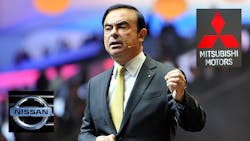Nissan Eyes Salvage Job With $2.2 Billion Stake in Mitsubishi
Carlos Ghosn, the man who helped pull Nissan Motor Co. back from the brink 16 years ago, is taking on a new salvage job: Mitsubishi Motors Corp.
Nissan agreed to buy a 34% stake in Mitsubishi Motors for about 237.4 billion yen ($2.18 billion), the automakers said Thursday. The capital infusion could prove a crucial lifeline to Mitsubishi, whose market value had fallen more than 40% after saying it overstated the fuel economy of its minicars and had been improperly testing Japan models since 1991.
The purchase will make Nissan the top shareholder in Japan’s smallest automaker at a discount. Further collaboration between the two would deepen an existing partnership that already involves joint manufacturing and vehicle development — and would represent another step toward a much-needed realignment of Japan’s crowded car industry.
“It’s a bargain deal for Nissan, though of course there are risks,” Koji Endo, an analyst with Advanced Research Japan, said. “This deal would create a win-win situation for all stakeholders, including Mitsubishi group and the government, which wants to protect jobs.”
The deal comes as Mitsubishi grapples with a serious hit to its reputation, declining sales and the potential for billions of dollars in costs from the scandal involving the fuel mileage performance of four minicar models, two of which are supplied to Nissan. After suspending deliveries of the affected models for the last two weeks of April, Nissan reported a 51% plunge in its monthly minicar sales.
“We obviously care about the viability of the company,” Ghosn, Nissan’s CEO, said in an interview. If Mitsubishi isn’t healthy, “we have a problem. Then, we have no kei cars for the Japanese market.”
Ghosn, 62, already has a track record for shaking up Japan’s auto industry. Taking over as Nissan’s president in 2000, he brought the then-struggling company back from the brink by breaking up its so-called keiretsu network of suppliers, shutting plants and leveraging an alliance with Renault SA.
In coming to Mitsubishi’s aid, the challenges ahead for Ghosn extend beyond getting minicars back on the market. The company has said nine more models might have been improperly tested in Japan, after initially disclosing that it had overstated the fuel economy of its minicars by as much as 10%.
Japan’s jam-packed auto industry faces increasing outlays to compete in an era where electrification, autonomous-driving technology and ride-sharing upstarts are on the rise.
“Since the auto industry is getting more and more competitive and requires new technologies, we knew we could not survive alone and were aware of the need to look for the partner sooner or later,” Mitsubishi chairman Osamu Masuko said in an interview. Masuko briefed the group companies on the partnership with Nissan, he said in an interview. “The Mitsubishi group is on the same page,” he said.
Home to worldwide sales leader Toyota and other global players such as Honda Motor Co., Japan has twice as many automakers as car-loving Germany, which has three. In the far bigger U.S. market, Ford Motor Co., General Motors Co. and Tesla Motors Inc. are the only independent companies left.
Buying part of Mitsubishi boosts Nissan’s exposure to Southeast Asian markets seen as strong longer-term bets for growth. Paced by Thailand-built Triton pickups and Pajero SUVs, Mitsubishi sold twice as many vehicles in the region than in Japan during the fiscal year ended March 30.
The Philippines would be among the countries where Nissan would benefit most, said Kazuaki Funahashi, an analyst with researcher Fourin Inc. Home to more than 100 million people, its car market is expected to expand. Motors trails only Toyota Motor Corp., while Nissan lags further behind.
Nissan’s purchase of the Mitsubishi stake mirrors Toyota’s deal in January to acquire the remainder of its minicar-making affiliate Daihatsu Motor Co. for about $3.2 billion in stock.
By 2020, Japan’s ranks of carmakers may shrink to no more than three company groups, driven by the rising costs of competing to make cars cleaner, safer and more connected, Takaki Nakanishi, an analyst at Jefferies Group LLC, said after Toyota and Daihatsu announced their deal.
“It’s difficult for small and mid-sized carmakers to do everything on their own,” Yasuyuki Yoshinaga, CEO of Fuji Heavy Industries Ltd., told reporters Thursday. The maker of Subaru vehicles has jointly developed sports cars and hybrids with Toyota. “We would like to value and maintain that relationship,” he said.
By Masatsugu Horie, Yuki Hagiwara and Ma Jie
About the Author
Bloomberg
Licensed content from Bloomberg, copyright 2016.
